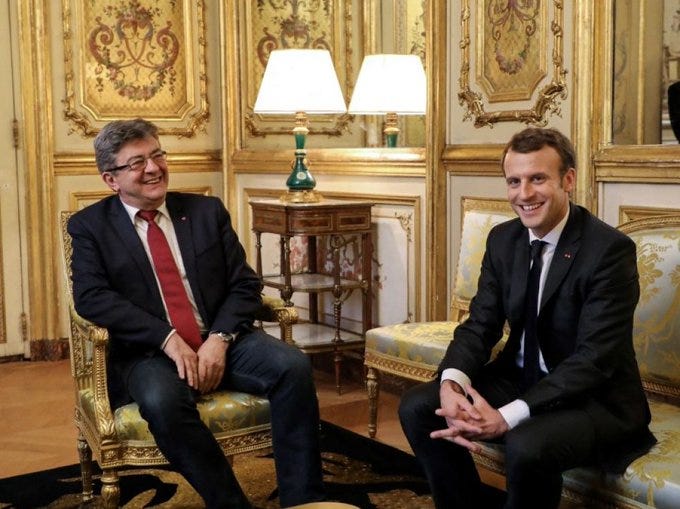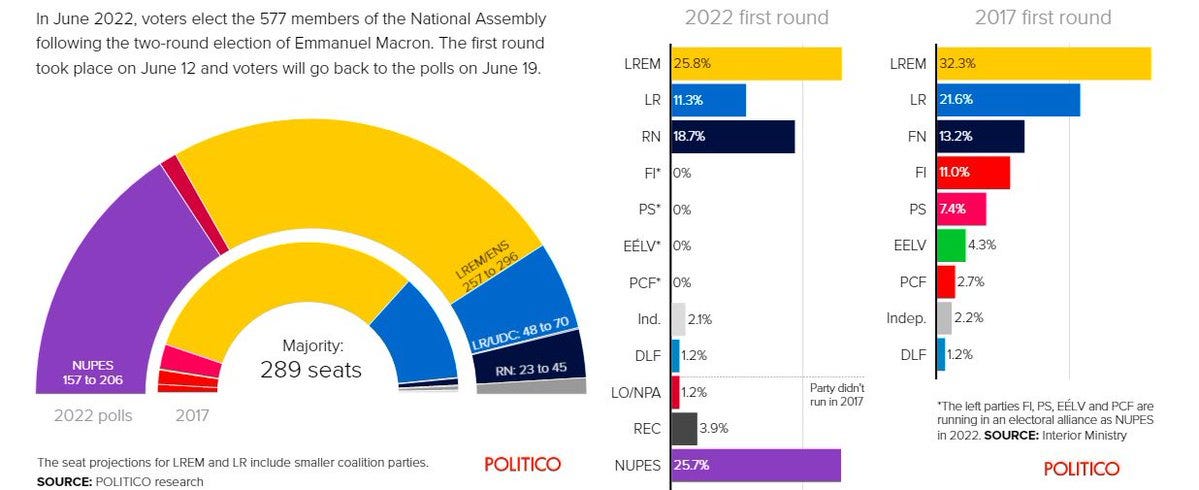The French Legislative elections & what you need to know
French voters are at polls today for the legislative elections, and we’ll be following coverage closely.
If you’re like me, a few readings and a great Twitter Spaces may help to inform you on the candidates, issues, and consequences at stake.
These legislative elections see current president Macron vying for seats against the Nupes alliance, headed by Jean-Luc Melénchon.
Step 1: Who is Melénchon?
A veteran firebrand of France's far left, Jean-Luc Mélenchon has a strong chance of depriving President Emmanuel Macron of controlling the next government.
He leads an alliance of far-left, left and green parties that took the president's centrist grouping right down to the wire in the first round of parliamentary elections. And he believes they can even win control of the National Assembly.
After Mr Mélenchon came a close third in the presidential election, the leader of La France Insoumise (France Unbowed) vowed to become prime minister himself to "revive the system". Now he says if his alliance, called Nupes, wins an outright majority, then Mr Macron will have to "give in" and name him as as prime minister - or resign.
That seems unlikely when voters elect 577 MPs in the second round on Sunday, but he could stop the president of winning the 289 seats he needs for a majority.
Nupes stands for Nouvelle Union Populaire Écologique et Sociale - new social and ecological people's union - and it's variously pronounced Nupe or Nu-PES.
Jean-Luc Mélenchon dropped a career in teaching and journalism for left-wing politics in the 1970s. He served briefly as junior education minister under Socialist Prime Minister Lionel Jospin, but by the early 2000s, he became disillusioned with the what he saw as the Socialists' drift to the right.
He became a Euro MP as part of a new left-wing party in 2009. But it was only when he formed France Insoumise that he broke through, winning 19.6% of the vote in the 2017 presidential election.
In the April 2022 presidential election, he achieved 21.95% of the vote, attracting a cross-section of voters on the left and coming close to beating far-right rival Marine Le Pen to challenge Emmanuel Macron in the run-off vote.
Immediately, he announced his intention to lead the government, adopting the slogan "Mélenchon Prime Minister". President Macron has made clear it is his job to name the prime minister: "No political party can force a name on the president."
Step 2: The Cosmopolitan Globalists
Claire Berlinski and the Cosmpolitan Globalist have been following French affairs at the local level: Claire lives in Paris as does Arun and Ann-Elisabeth.
The French Election Twitter Summit: Final round
The polls show Macron’s alliance winning the largest bloc of seats but may fall short of an absolute majority (289 seats) in the new Assembly.
In the face of international crisis, France has lost the plot, writes John Lichfield:
France’s parliamentary elections are only halfway through, but the seemingly inevitable result is a muddle that will leave France unable to react rapidly to the growing international and economic crisis.
The French legislative elections: between the rounds, by Arun Kapil, who politely discusses inter alia Cole Stangler’s article in the New York Times:
One piece on the election that has been receiving attention, as it was published as a guest essay in The New York Times, is by the Marseille-based, decidedly left-leaning American journalist Cole Stangler, who informed readers that “Something extraordinary is happening in France,” that extraordinary something being the Jean-Luc Mélenchon-led NUPES, on which I opined in my post last week. Just about every reaction I’ve seen to the essay on social media has been a gushing thumbs up to Stangler’s enthusiastic assessment of the NUPES …
I’m in general sympathy with his views, but he’s wildly over-optimistic as to the prospects for the Nupes and simply wrong on many points. If the Nupes wins a majority of seats and Mélenchon is appointed PM—neither of which will happen, but assuming they do—this would be terrible, indeed disastrous, for France, Europe, and ultimately for the left. The Nupes’ economic program is, pace Thomas Piketty & Co, pie-in-the-sky, i.e. it’s nuts, and JLM’s views on geopolitics are unacceptable. A French PM who is not fully committed to materially supporting Ukraine against Russia—and reiterating France’s commitment to NATO—is not in anyone’s interest apart from that of Vladimir Putin. A Macron-Mélenchon cohabitation is totally impossible.
A generational divide, by Arthur Goldhammer:
In the past, a handy way to describe Macron’s base was to say it consisted of people who were doing relatively well. Apparently, this is no longer the case. Voters with diplomas and jobs are nevertheless abandoning Macron for la NUPES. Why? Any number of explanations are possible, and the data are not detailed enough to distinguish among them. Le Monde suggests that these NUPES supporters are people who have careers but find their hopes of advancement frustrated. Perhaps they expected Macron to restructure things so as to give them a boost but found that he simply perpetuated the existing hierarchies. Commitment to environmental protection is also stronger in this group, which may find Macron’s inaction on this front unacceptable. No doubt there are also many in these groups who think of themselves as on the left yet voted for Macron in 2017 only to feel betrayed when his government took a rightward turn.
An Optimistic Scenario, by Arthur Goldhammer:
Yesterday I wrote that a) la NUPES would not win a majority in the legislature but b) would win enough votes to deprive Macron of an absolute majority, and that this would have the paradoxical effect of forcing Macron to seek the support of Les Républicains, thus driving the president even farther to the right than he would prefer to govern. Any number of other commentators have voiced similar sentiments, including Thomas Legrand on France Inter and today in the New York Times the left-wing journalist Cole Stangler, who writes: “France’s winner-take-all system gives an advantage to the more mainstream Republicans, who would be more natural governing partners for Mr. Macron.”
But there is another and to my mind more optimistic scenario in the offing. While it is true that la NUPES will nominally constitute the primary opposition to Macron, there is absolutely no guarantee that this loose electoral coalition will remain united on all issues. On particular measures, especially those relating to environmental issues, the government can seek the support of the Socialists or Greens, say, rather than trying to woo LR. And since we are now told that Macron is not wedded to the pension reform that has driven a wedge between him and the moderate left–“Macron sur les retraites: «64 ou 65 ans, je m’en fous!», as Libé headlined yesterday–compromise on issues of mutual concern seems within reach.
And Alexander Hurst writes:
If this were the US, where government spending is 46 percent of GDP, I’d say, ok sure. “Price caps” and “everyone gets more money!” is insanity in a country where gov share of GDP is already 62.5 percent. Hope y’all are into massive shortages of everything and unemployment like ya never seen.
This is fantasy land. There is no way to finance that much additional spending unless you have massive growth. And you won’t get massive growth inside a single market with mobility of people and capital by restricting prices and hiking corporate taxes, you’ll get big unemployment.
Which is obviously why LFI is Frexit-sans-le-dire.
And if you think THAT’S a good idea, well…
Step 3: Listen to The French Election Twitter Summit: Final round
In their whitty, rambunctious style, Claire Berlinski, Jerome Clavel, Arun Kapil and Anne-Elisabeth Moutet discussed the elections on Saturday on Twitter Spaces. I really hope they continue these chats in the future as they are so informative and, frankly, fun. Click on the tweet to listen to the recording.

A suivre…
Mo








🤬🤬🤬🤬🤬🤬🤬🤬🤬
I have only heard the results recently.